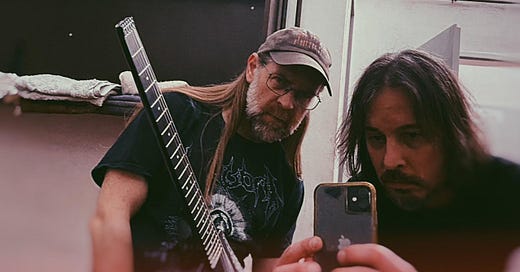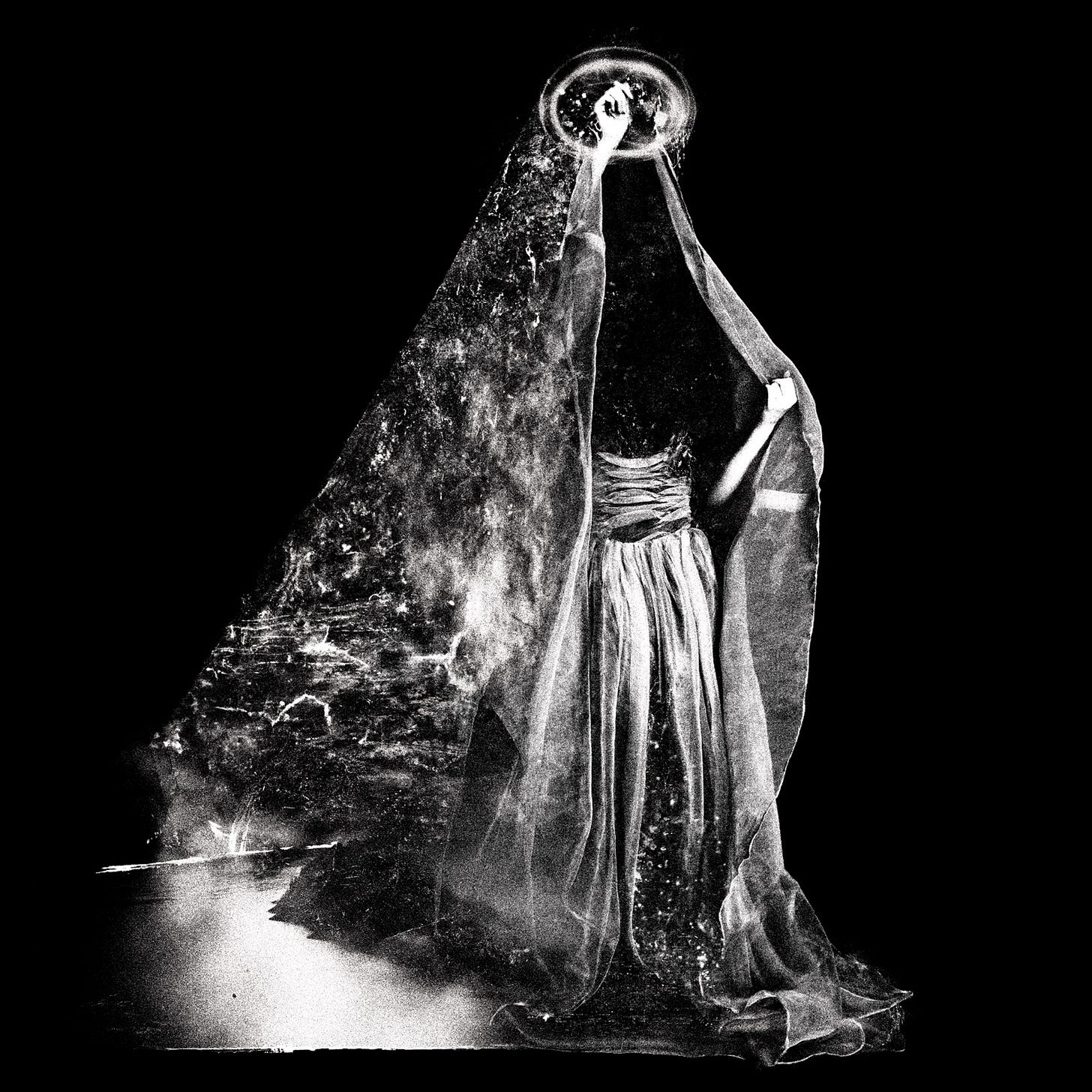BAND OF THE WEEK: The Overmold
Mick Barr + Tim Wyskida + a transcendentally beautiful, fathomless void = The Overmold
I mean, look at that photo. If one band pic (and in this case it really is the one band photo that exists) ever described the personality of their musicians any better, I don’t know it. Rule-breakers and status quo ignorers by nature, both Mick Barr and Tim Wyskida have spent their careers going places where no others have tread before. Mick’s string wizardry has never known any bounds, and while most will be familiar with Krallice, his body of work is gigantic and immensely varied, scattered throughout various projects - if you need to discover more, I recommend starting with Ocrilim and just listening to stuff and following links. As for Tim, Khanate is obviously the name that stands out most on his musical CV, but add in Blind Idiot God, Jodis or Khlyst among others, not to mention his more recent involvement in Insect Ark, and it’s clear that he is one of the most talented, outside-the-box drummers of his generation.
So now that the two have joined forces - or should I say, now that we get to hear the result of them having joined forces a while back already, since this music, and in particular the colossal title-track, have been in the works for some time - as The Overmold, curiosity is naturally rampant on what it will sound like. As both told us in the awesome interview we did with them (scroll down if you want to jump to that straight away), there really wasn’t any idea or specific plan as to what kind of stuff would come out. After having the privilege of listening to the full album in advance (it’ll be available on March 28 - get on it! links below), I can tell you that no matter what you’re thinking, it isn’t what you thought it would be.
Dominated in great part by its titanic 35-minute opening title-track, of which you can already listen to an excerpt which gives you a good idea of the vibe, ‘The Overmold’ is a remarkably spacious, uncluttered listen, generally speaking. It’s a very overplayed image, and scientifically incorrect too because there’s no sound in space, but after years of sci-fi movies and imaginations running rampant, it is the sort of ominous, mind-altering creepiness you’d expect to hear if you were floating about on some distant galaxy, lost in time and space and ready to be swallowed by a black hole. The actual black hole bit is also present, as the music heaves and seethes to its own inner pulsations, the dynamics pulling you back and forth between searing intensity and contemplative clarity so much that it’s a surprise you can walk a straight line after listening to the whole thing. Vocals are used sparingly and mostly as ghostly whispers, except for ‘Song Of The Beyonders’ which features a stellar performance from Judith Berkson, so good that it turns it into as much of a highlight as the planet-eating monstrosity of the title-track. There seems to be an almost infinite potential for collaboration and development here, so hopefully these two busy dudes will find some time in their calendars to further work on this project. Promoters worldwide, also take note. There’s something special brewing here.
As much Oranssi Pazuzu as Darkspace, and also not even close to any of them, this is a surprisingly engaging, atmospheric, oddly beautiful and deeply experimental album that already constitutes one of the highlights of early 2025. Mark it on your calendar!
‘The Overmold’ is out on March 28th via I, Voidhanger Records. You can pre-order here.
You can find The Overmold out there, among the stars.
Check out our interview with Mick and Tim below.
“I guess I don't really ever consider accessibility in anything I work on.”
- Mick Barr
Can you tell me the origins of The Overmold, how and when did you guys decide to work together on something?
Mick Barr: We had sort of floated the idea of collaborating a few times in the past, but this particular project began in January 2016. I believe I ran into Tim on the street somewhere in New York City and we exchanged our updated contact information. He had mentioned having access to a rehearsal space at his place of employment, which was an easy commute for me, and so we began getting together weekly or bi-weekly to see what would form.
I suppose you’ve known each other for quite a while though, right?
Tim Wyskida: We actually first met around 2003 when my band Khanate played with his band Orthrelm at Tonic in New York City. I was blown away by their set. Never heard anything quite like it before or since. After that, we’d see each other at our own and other bands' shows around town. Occasionally we’d mention working on music together. Around 2016, after that chance meeting, we got serious about it and started piecing together music at SIR Studios, where I worked at the time.
What did you think of the other’s work before this, generally speaking, and was there anything that surprised you when you actually began collaborating?
Tim: Yes, it is the first time we properly worked on music together. Prior to The Overmold, around 2007, James Plotkin and I recorded ideas that we passed on to Mick. He recorded heavily-layered guitar tracks. We attempted to find a vocalist and move forward. It never happened. For that project, Mick and I never played in the same room together.
Mick: I loved the juxtaposition of my hyper fast high-pitched trebly band with Khanate's particular pulse-less glacial movements. I always loved Tim's use of space and sound in everything he did. And I knew he was capable of playing with more discernible dynamics than most drummers, which after years of ignoring dynamics I was finally interested in exploring. What I found surprising when we started working together was how closely he was listening to everything. Like he caught everytime I hit a wrong note, or was out of tune even. I had gotten used to drummers being too caught up in their own counts and numbers to actually pay much attention to what I was doing.
Tim: Regarding my thoughts on Mick’s music prior to properly working together, I was in awe. After we met at that Khanate/Orthrelm show, I’d regularly go to his shows around NYC. He played a lot of solo shows and eventually Krallice shows. His speed was impressive of course but he had something most speed demons don’t have, a great sense of melody. When we began collaborating, I was pretty certain we’d play fast music. I was actually a bit concerned I’d be able to keep up. In Blind Idiot God I play fast but not as relentlessly as Mick’s usual efforts. Not only was I surprised that Mick came in with spacious, long-sustain ideas but that they were actually great. Most musicians who focus on fast playing have no idea how to make slower playing sound good. Mick had a total grip on that.
So it seems like it wasn’t entirely clear from the beginning what kind of music this would be?
Mick: I would say it wasn't clear to me at all, and I was excited by the uncertainty. Most of my musical output has been of the faster variety, and I knew Tim was capable of that sort of thing, but I was also very curious to see what would come naturally from us just playing together. I think for our first rehearsal I brought in a few riff ideas to try and mess around with, which were likely the first few riffs of the first song on the album.
Tim: There wasn’t much discussion about what kind of music we’d play, no. Mick and I got in the room and he played a few ideas. The vast majority of music I’d heard from Mick was uptempo, so I sort of expected we’d go in that direction. His ideas were mostly the opposite, they were very spacious. I had a lot of tested and untested ideas on how to play drums in spacious music, in a way that gives it a good flow. To my ear, a lot of slow or spacious music sounds stiff when it’s time-based and too fragmented when it’s pattern-based. Every rehearsal, Mick had another two or three ideas which we added to the song, which ultimately became 35 minutes long. I obsessed on making each idea pair well with the idea just prior or after, so we didn’t end up with a fragmented sounding piece of music. I wasn’t sure what the final outcome would be but in the end, the good flow effort worked out even better than I envisioned.
Would you like to talk a bit about the meaning of the band title, and also any concept that the album might have in general?
Mick: The original bandname idea was Over. I liked the finality of that name (I was also working on a different project at the same time called Done, which still hasn't come to fruition). and the original album/song title idea was ‘The Divinity Of Mold’. however looking into it all, there were too many other bands with the name Over, and the lyrical concept shifted slightly, but the Overmold seemed to resonate with the music. Imagining a mold-like deity slowly spreading throughout the universe type thing...
It would probably sound like that first song! Let’s talk about it - it’s quite the statement to not only lay down a 35 minute track in your first release, but also to make it the opener. What’s the full story behind it?
Tim: We never discussed how long any of the pieces of music would be. Perhaps Mick had a thought to create a long piece, but it was never discussed. We just followed where the ideas led us, without being too precious about it.
Mick: That song was the only song for a long time. I think initially I even thought it would probably be the only song we ever wrote. Slowly and surely we worked that one over and over, as it slowly grew in size and dimension over a couple years. The other three songs were written after the fact. Actually one of the them, ‘Song Of The Beyonders’, is a new version of an old song of mine, formerly known as ‘Mars’. i don't remember much about the writing of the other two, to be honest.
The recording seems to have been a very spontaneous process in the end, I guess you guys were extremely well prepared already. How did it feel when you had that monster finally laid down and immortalized?
Mick: It took a long time to write the song structure, and I had all the vocals and lyrics together and ready to go, and read along with them while we tracked to make sure they all fit. The recording of just the drums and initial guitar was very quick indeed, we had been practicing it for a couple of years at that point. I believe we did the whole thing in one take, we might have done a second take of one section or so, but I don't entirely recall.
Tim: I have an aversion to pride but I felt sort of proud and relieved after we recorded the music, the 35 minute track in particular. I think we spent about two years writing and working out that piece of music. We had it down so well, we played it beginning to end only a couple of times in the studio, with little to no mistakes. I’ve heard Mick play very long pieces of music, which have no repetition within them. Prior to fully memorizing the 35 minute The Overmold song, I wasn’t sure I could remember that many different parts, strictly from memory. We didn’t use notes. A testament to the power of the subconscious and muscle memory.
Mick: The initial idea of this project was actually to have a different singer perform all the vocals, and so we sat on the basic recording for a bit while I tried to get someone to work on the vocals with. Unfortunately everyone I tried to work with on it either didn't quite get the feel initially, or didn't quite have the time to put into it. So sometime during the pandemic I decided to finish it on my own. Whether we would ever release it or not I wasn't sure, but I wanted to hear it completed. So I laid down bass, second guitar, and a myriad of vocals and sent it all off to Colin Marston to mix it down. The vocal mix we decided on was a very quiet, almost ghostly approach, which actually fit the vibe of the music much better than the initial idea.
The press release mentions something interesting, as it says the album is “experimental without being inaccessible”. Of course this is all relative, but I think it’s clear that both of you have made much more quote-unquote inaccessible music in the past. I think one of the things that feels really unique about The Overmold in general is how uncluttered and in fact quite clear it all sounds. Was this somehow a concern, something you had in mind, to not let it become to overly dense and complex?
Mick: Not really, just the natural course of things once we began writing together. I guess I don't really ever consider accessibility in anything I work on. Is "uncluttered" a more accessible trait do you think? [good question, Mick - I suppose that, like most things, it depends!]
Tim: Yeah, we didn’t discuss keeping it uncluttered or minimalist. It was a matter of following our taste every step of the way. We were well-aligned in that regard. I can’t remember any disagreements on any of the decisions with the music.
It’s funny that doom is one of the genre words thrown at this – I think that’s mainly due to the slower and murkier nature of it rather than the density that in my opinion is so characteristic of that genre. Well, genres names are what they are, but if you had to describe this music with any kind of words, how would you attempt it?
Mick: Spacey, meditative, ghostly, sometimes twangy... I don't really know. I prefer to let others describe my music. Thankfully I, Voidhanger knows how to describe things better than me.
Tim: Pattern-based Aural Flow.
I do love the song with Judith Berkson in particular, I have to be honest. And though I do love the long instrumental sections, when Mick’s vocals also appear, I think the music immediately gains an extra dimension. Might you go back to that plan of inviting different vocalists to keep this vocal element present in your songs, you think?
Mick: Well, this begs a different question, and that’s what is the future of this project in general. And who knows. We have zero plans past releasing this album. I don't know if we'll perform, or write and record again, or what. But I'm down to try anything, so we'll see.
You’re right, and we’ll get to that. In the meantime, however, could you introduce Judith a little better to our readers, while we’re at it?
Mick: Judith Berkson is an old dear friend of mine who also happens to be an amazing composer and singer. Her music is some of the most original I've heard, from microtonal compositions, to her cantorial research and performing, to drum machines, noise, and whatever else she wants. She works under her own name and the project name Liederkreis.
[discover more about Judith here]
So yeah, I kinda jumped the gun with that question there - so, no plans, but the will to do something more is there. I hope it happens, this stuff must sound amazing live!
Tim: We discussed playing full-on The Overmold sets, of course. We’ll dig into the possibilities after the album comes out on March 28th. I’d love to play this music live.
Mick: Yeah, like I said, I'm open to whatever opportunities present themselves and I'm hopeful that more things will happen. We did get the opportunity to perform a little of this material together last year at CTM Festival in Berlin, under the name of Ocrilim featuring Tim Wyskida. The material we performed was half Ocrilim music, half The Overmold. It was performed on banjo and drums at Berghain, and because of their no filming policy, no footage exists. So maybe it didn't happen at all?
Want an exclusive tote bag? Become an subscriber of TDM and we’ll send you one, free postage worldwide. Also, never miss a post again (‘cause you’ll get ‘em in your inbox) and access our subscriber only posts. Get on it:







